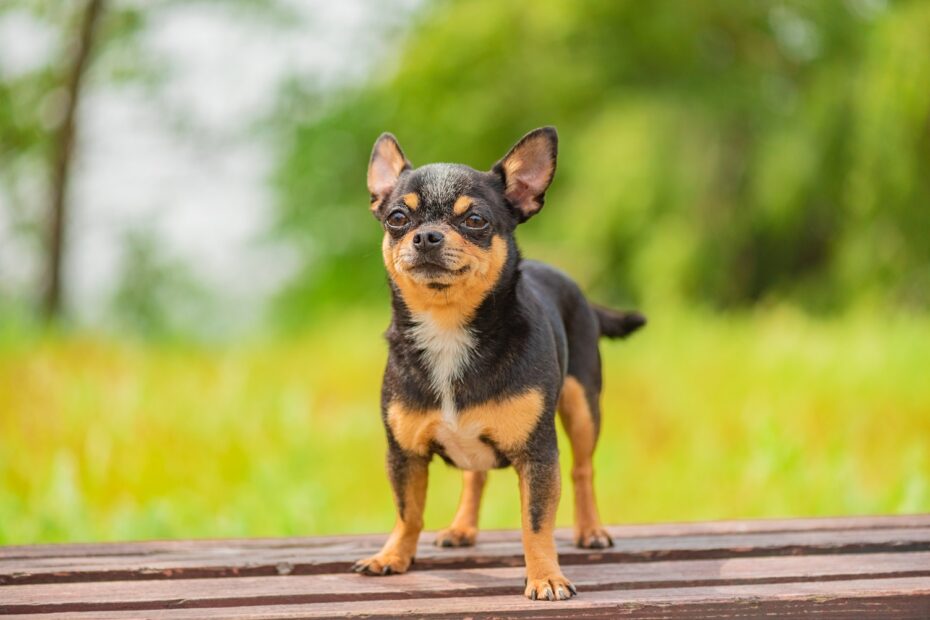If you’re dealing with a problem like a Chihuahua growling, there’s one thing you need to know. You’re not alone.
Chihuahua’s might be the smallest dog on the block, but they’ve got big personalities. Most of the time, that’s a good thing. Other times…. not so much.
If you thought choosing the world’s tiniest soldier would give you a get out of jail free card for training, think again. Chihuahuas need just as many boundaries, just as much socialization, and just as much training as the next dog.
Forget to give it to them, and the next thing you know, you’ll be dealing with that most feared of all things…
…Small Dog Syndrome.
Poor social skills, disobedience, aggression…. as syndromes go, it’s not the prettiest. Of course, a Napolean complex might not be what’s making your dog growl. But there’s a very good chance it is.
Ultimately, figuring out what’s behind the problem is the most important step.
From there, it’s just a matter of matching the solution to the problem.
If that sounds easy, I should clarify. It’s not.
Not in most cases, anyway.
It’s going to involve hard work, consistency, and more patience than you thought possible.
Fortunately, there’s a simple way you can get things off to a flying start.
It’s called the Dog Calming Code, and it’s a program that’s been specifically put together by Dan Abdelnoor over at The Online Dog Trainer to deal with this exact kind of problem.
If you want a calmer, more controlled dog that’s more inclined to listen to your instructions than growl over them, check out the video link below:
(video will open in new window)
Why is my Chihuahua Growling?
Chihuahuas might be small, but these are dogs that shouldn’t be underestimated.
They’re dignified. Fearless. Bursting with courage and full of pluck.
They’re also fickle, headstrong, and prone to doing what they want to do… when they want to do it.
All of that comes with consequences. And sometimes, those consequences come with a snarl and a growl.
Obviously, a growling Chi is a different proposition to a growling Pittbull. Heck, it’s even a different proposition to a growling Spaniel. And therein lies the problem.
Ultimately, we know that no matter how much a Chi growls, how hard they throw a temper tantrum, and how often they bare their teeth, they aren’t going to cause any lasting damage.
If they start snarling at a stranger on the street, it doesn’t take much to scoop them up and move along. It doesn’t take much to convince people that their disobedience is cute rather than a training problem.
Basically, turning a blind eye to undesirable behavior in a Chi is easy. And it’s certainly a lot easier than taking the time to train and socialize them.
The problem is, turn a blind eye to undesirable behavior once too often, and eventually, it’ll become a habit. However, if you can tackle the problem at the onset, you’ll be doing both your Chi and yourself a favor in the long run.
Like anything else, the more you understand what’s driving the problem, the better positioned you’ll be able to tackle it.
So, what are some of the common reasons for growling?
Poor Socialisation
Being the smallest dog in town isn’t always easy. Everyone is bigger than you, everyone is tougher than you, and you’re constantly at the whim and mercy of every person and every dog you come across.
And that’s scary.
It’s particularly scary if you haven’t been socialized to see the world as a fun place rather than a big, bad, dangerous one. And that’s the crux of it.
Chihuahuas have earned a reputation as yappy little ankle-biters prone to growling, snarling, and biting.
The truth is, they aren’t that way by nature. We make them that way by carrying them around and restricting their opportunities to interact with other people and other dogs.
Obviously, all dogs are individuals, but a well-socialized dog is generally one that’s happier and more well-balanced than one who isn’t.
By contrast, a poorly socialized dog is one that’s prone to getting anxious and scared at everything that’s bigger and more frightening than them.
Which, in the case of Chihuahuas, is pretty much everything.
If your dog sees people and other animals as threats rather than potential friends, they’ll feel cornered, defensive, and more inclined to growl at the scary thing than smile at it.
Related Post: How To Socialize An Aggressive Dog – A Step By Step Guide
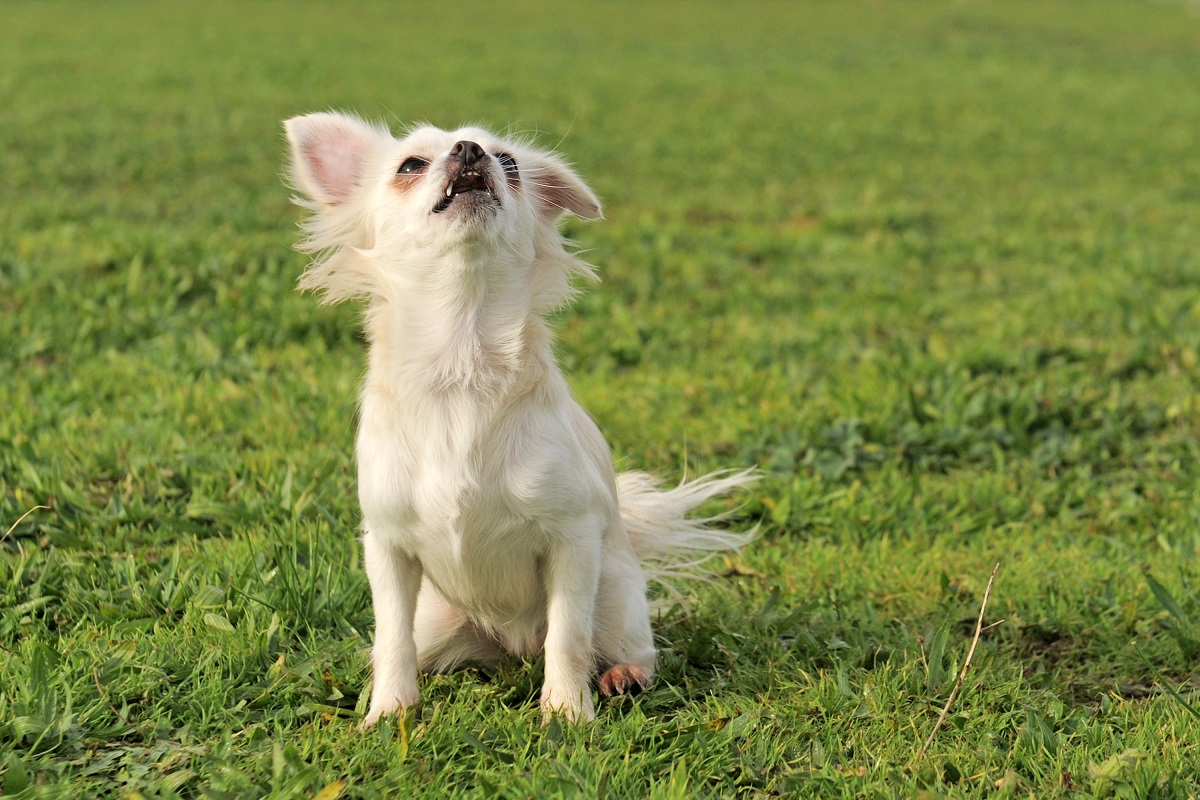
Lack of Training
Chihuahuas aren’t dumb. They’re fully aware of how cute they are and have no hesitation in playing it to their advantage.
People, on the other hand, are dumb. We fall for it, each and every time.
We let them get their own way as pups, never let them know who’s in charge, and get lacksadaisy with training. So by the time they reach adulthood, they’ve got no idea what constitutes acceptable behavior and what doesn’t.
No matter how small they are, Chihuahuas need to be trained. If they aren’t, they’ll rule your household with an iron fist.
If they feel you’re stepping out of line, not doing what they want, getting between them and something they want. Or doing one of a hundred other things that annoy them, you can bet your life they’ll let you know about it.
Basic Instinct
Chihuahuas are extremely territorial, especially towards their owner. Even if they live in a big household with lots of family members to hang out with, they tend to pick one person out for special attention.
If you happen to be that person, you probably think their loyalty is sweet. If you’re not, you’re more likely to see it as a nuisance.
If a Chi sees anyone approach their favorite person, their protective instincts go into overdrive, resulting in barks, snarls, growls, and eventually, full-frontal attack.
The behavior tends to be more marked with dogs that haven’t received proper training or socialization from an early age.
Pain
Chihuahuas aren’t the kind of dogs that should indulge in roughhousing. No matter how much kids want to play with them, they need to be taught proper handling methods.
If they aren’t, it’s only a matter of time before the laughter turns to tears, both for your Chi (who’ll naturally growl if they’ve either been hurt already or don’t plan of getting to that stage) and the kids, who probably never released how quickly cute can turn to scary.
Chihuahuas, like other dogs, will also growl if they’re in pain, whether that’s from an illness or injury. In these cases, it doesn’t stem from aggression. It’s simply their way of saying something hurts.
Play
Not all growls come from a bad place. When a dog growls during play, it’s usually nothing more than an expression of happiness.
If you’re not quite sure whether your Chi is growling out of playfulness or for another reason, take a look at their body language.
If the growl is accompanied by pricked ears, bared teeth, a confident, alert posture, and a tight-lipped muzzle, take it as a warning sign.
It could be that they’re protecting their food, their favorite person, or even a toy.
Either way, it’s their way of saying “Back Off.”
If they lower their head and body slightly and pin their ears back, it’s likely they’re growling out of fear.
If they crouch down in a bow posture, raise their butts in the air, bounce around a little, and flash their teeth at you in a relaxed grin, don’t panic- they’re just feeling frisky and in the mood for a game.
Related Post: My Dog Growls At Me – How To Quickly Deal With Growling Issues
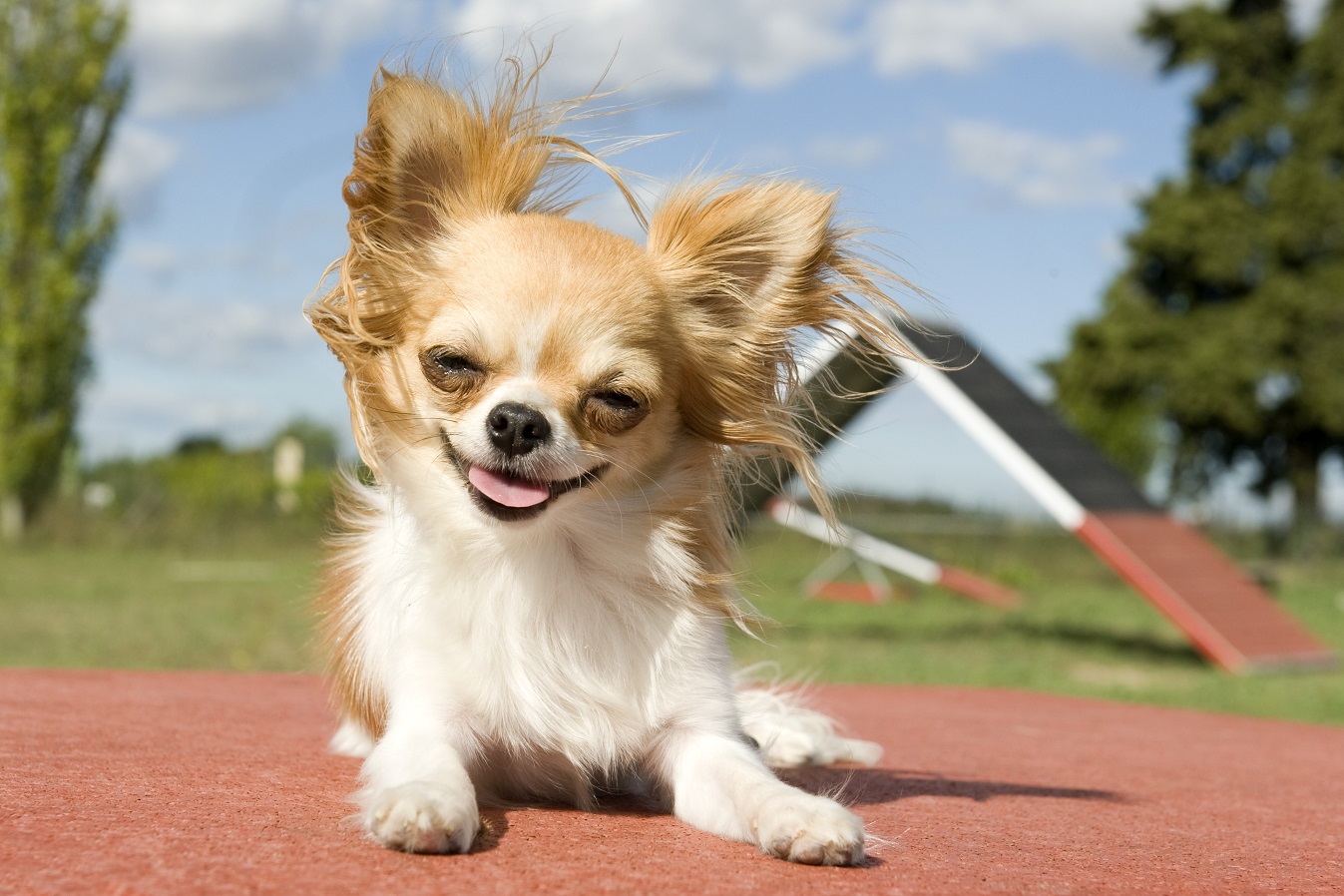
How to Stop a Chihuahua Growling
Expecting your dog to relax by telling them to take a chill pill doesn’t work. If you want to teach your Chi that growling isn’t tolerated, you need to show them other ways to act.
As a start, check out the Dog Calming Code I mentioned a little earlier. It’s an easy and effective way to teach your dog how to calm down, relax, and start seeing you as a leader.
Even if you’ve never trained a dog in your life, there’s nothing complicated or technical about the method. It’s simple, straightforward, and a brilliant way to teach your little Chi the value of emotional control.
After that, it’s time to get socializing, get training, and get your Chi to understand that it’s not their job to protect you.
Once they learn the outside world isn’t as threatening as they think, they’ll be less prone to reacting aggressively towards it.
Obviously, it’s easier to train a puppy than an adult. But age isn’t a barrier to learning new and better behaviors.
Providing you reward good behavior, avoid punishment, and redirect poor behavior, you’ll be at the finishing line before you know it.
Here’s how to get there…
Get Socializing
The best thing you can do for your Chi is to start introducing them to new people and new things as soon as you possibly can.
A Chi who spends all their life being shielded from the world will never learn to face new situations with confidence, rather than fear and aggression.
The trick to socialization is to go gently to avoid making your dog feel overwhelmed or frightened. So start by setting up some play dates with a friend with a particularly gentle, placid pooch.
From there, work on slowly introducing them to an ever-greater range of new experiences, whether that’s the dog park, a bus ride, or a big family reunion.
Give Them Plenty of Praise
Chihuahuas are people pleasers. They might not always understand the right way to go about it, but their ultimate goal is to love and be loved. So give them what they crave.
Each time they react calmly to a situation or display good behavior, mark it with praise and attention.
When they growl or display any other undesirable actions, do the reverse.
If your Chi knows that acting in a certain way gets them nothing but acting in another way gets them attention, which do you think they’ll end up favoring?
Remember, no matter how badly your Chi behaves, never punish or yell at them. You’ll scare them, damage your relationship, and only make them more prone to lashing out in the future.
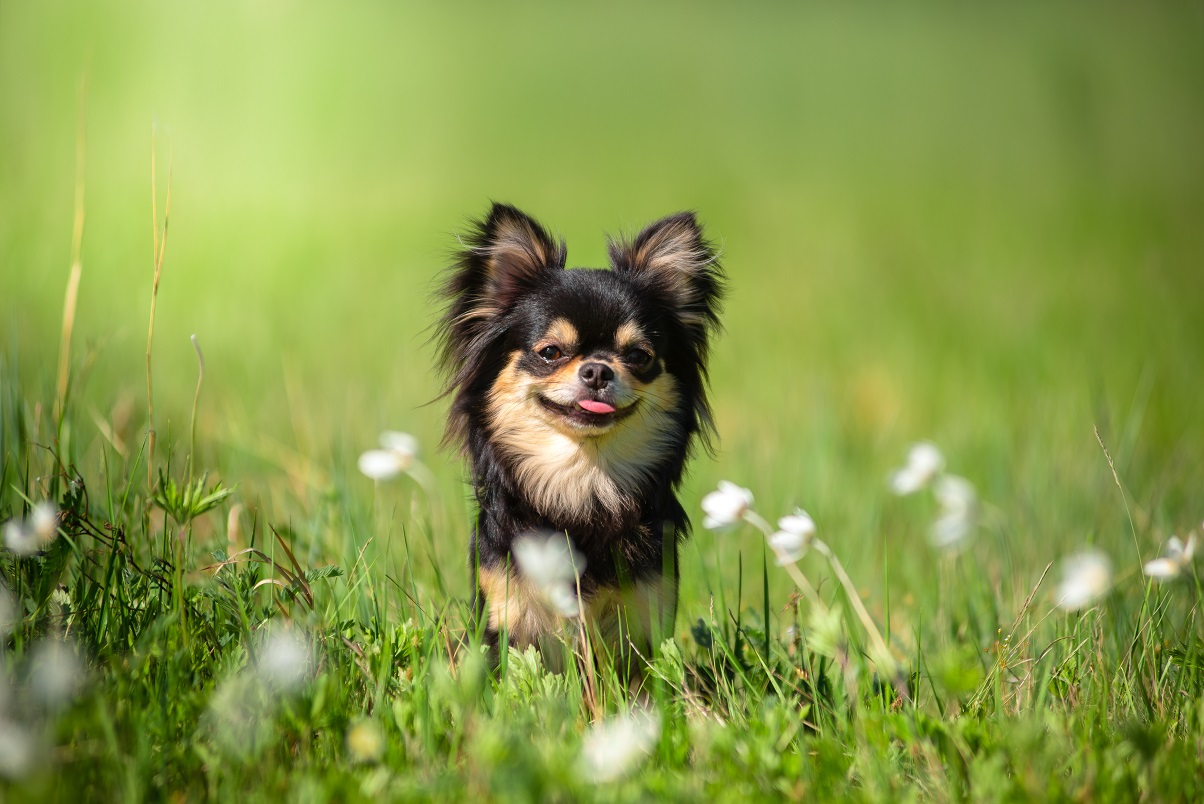
Train, and Keep Training
If you thought training a Chi began and ended with potty training, prepare to think again.
Chihuahuas are headstrong and feisty – neglect their training, and you’ll never have a moment’s peace again.
Training isn’t the complicated, arduous business it’s sometimes portrayed as. Commands such as sit, stay, and come are easy enough to master at home and will go a long way to stopping your Chi from threatening or attacking other people.
If you do find yourself struggling with motivation or inspiration, obedience classes are readily available (and provide a great opportunity to socialize your Chi to boot).
Just make sure that once you start, you carry on. Training isn’t a one-time thing – consistency and continuity are key to success.
To get your dog in the right frame of mind for training, remember to check out the Dog Calming Code.
Establish Yourself As Pack Leader
Despite their tiny stature, Chihuahuas have a terrible habit of considering themselves the pack leader. Once they get comfortable in that position, any prospect of them listening and obeying your commands goes out the window.
Meanwhile, the potential for them to feel the need to protect their possessions (and yep, that includes you) by growling and acting as intimidating as they can jump through the roof.
Getting a Chi to respect your status as a leader doesn’t mean resorting to shouting or punishing them. It means acting calmly, setting boundaries, and following through on rules.
When you make a house rule, stick to it. Don’t be guided by their cuteness.
It’s up to you to decide when they get fed, up to you to decide what furniture they can jump on, and up to you to decide when it’s time for play and time for rest.
Be firm, be consistent, and use plenty of positive reinforcement.
It may take some time, but eventually, your dog will understand that you’re the one wearing the trousers and come to respect your rules.
Teach Them Impulse Control
Chi’s are headstrong little creatures who tend to let their emotions get the better of them. More often than not, that ends in growling, snapping, and other undesirable behaviors.
If you want to get on top of the behavior once and for all, you’ll need to teach them how to control their emotions… Rather than letting their emotions control them.
To set them on the path to success, take a moment to check out the Dog Calming Code. If you can implement the techniques you see, you’ll be well on your way to a calmer, more focused dog.
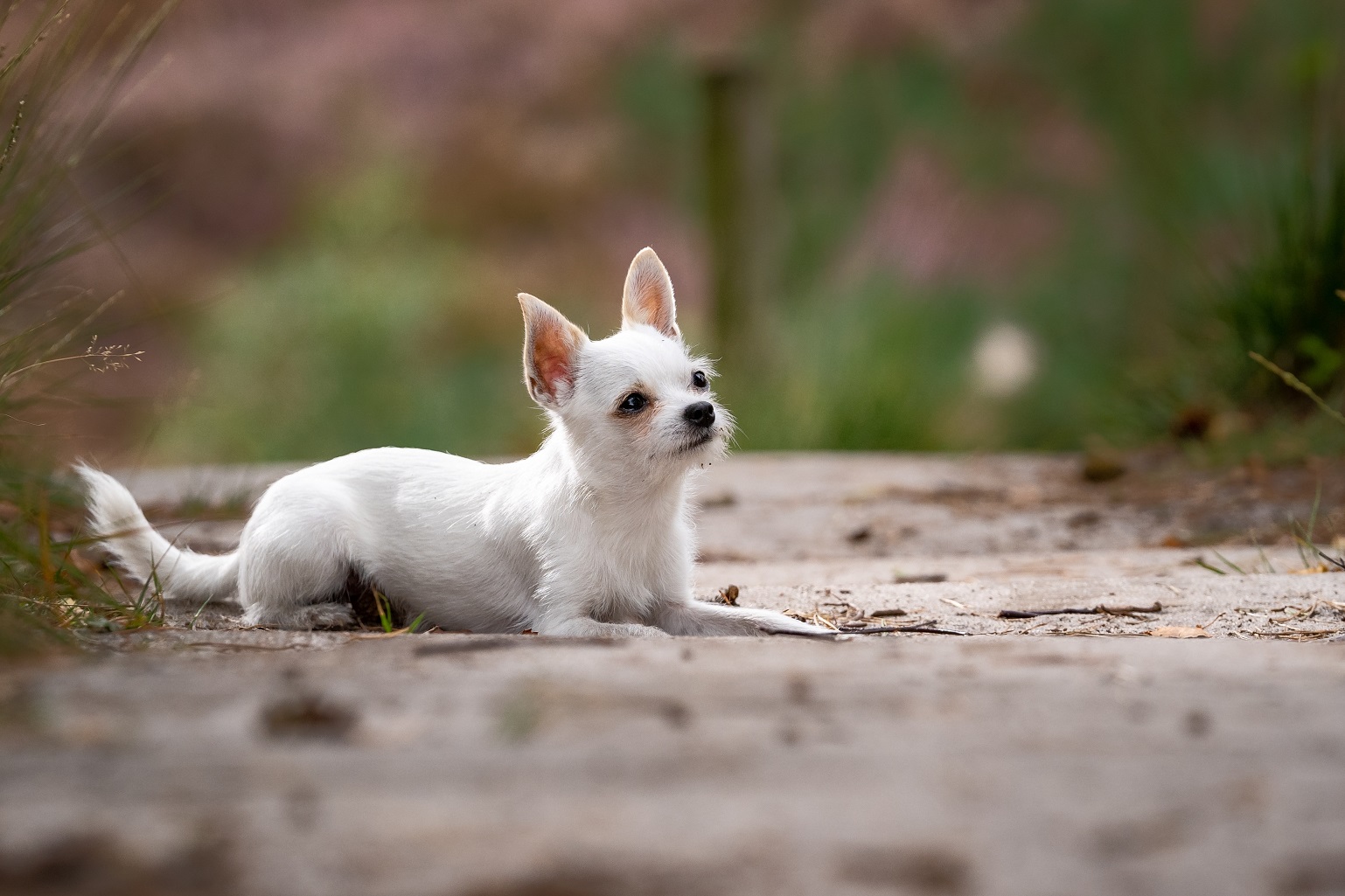
Wrapping Things Up
Chi’s might be small, but that doesn’t mean you can take growling or any other undesirable behaviors lightly.
Fortunately, there are plenty of ways you can address the problem before it escalates into something more serious.
The first step? …Stop treating them with kid gloves.
Yes, they’re small, and yes, that makes them more vulnerable than bigger dogs.
But does that mean you should carry them around in your purse or keep them confined to the house?
Absolutely not.
Only through experiencing the world will your Chi become used to it. And it’s only once they become used to it that they’ll stop seeing it as something to be growled at.
Socialization, training, and leadership are all key to a well-behaved, well-mannered dog.
Master all three, and you’ll be home and dry before you know it.
